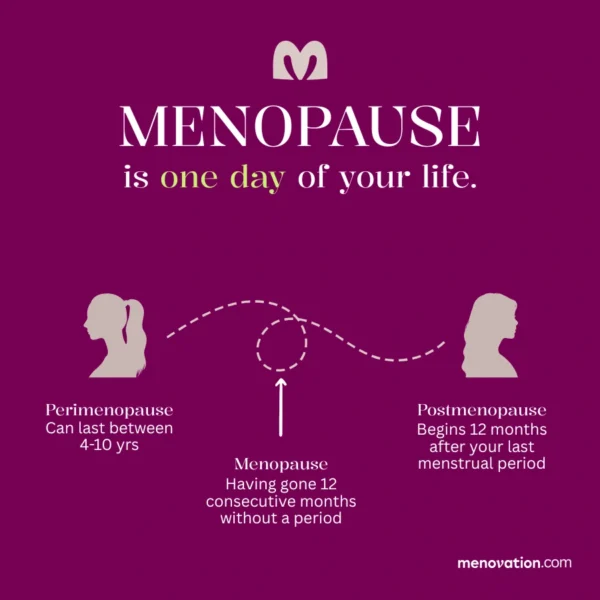Menopause vs. Perimenopause: What’s the Difference?
By Ashley Nowe
Published:

Night sweats, mood swings, and hot flashes – oh, my! These, and more, are common symptoms of the perimenopause and menopause transition. But people often speak about them only in hushed whispers or behind closed doors.
You may have heard about “the change” from your mom, aunts, or other women. Or maybe you didn’t know what was happening until you experienced it. Either way, you might feel confused, surprised, or even lost.
However, it’s not a secret. All women will reach menopause. It’s a normal part of aging. So let’s break the silence around the stigma of (peri)menopause and start talking about it.
So, What Exactly IS Menopause?
Whether you’ve had a child or not, all women eventually enter menopause, marking the end of reproductive years.
You’ve officially reached menopause when you haven’t had a menstrual cycle for twelve months in a row. At this time, your ovaries stop releasing eggs and you are no longer able to get pregnant.
Most women hit menopause between 45 and 55, with an average age of 52 in the U.S. But getting to menopause is a process that typically lasts several years.
What is Perimenopause?
Perimenopause is the time leading up to menopause. It can start several years before your final period.
During this transition, your ovaries slowly produce less estrogen, leading to hormonal fluctuations and a variety of symptoms. Your body is, in a way, going through puberty in reverse.
Typically, perimenopausal symptoms begin in the early to mid 40-s (though it can range).
Some women have no or mild symptoms as their bodies produce less estrogen. For others, symptoms are more intense and varied.
How Do I Know If I’m in Perimenopause?
Perimenopause can affect your physical, emotional, mental, and social well-being.
The decline of hormones is at the root of perimenopause symptoms. And this decline is more of a roller coaster ride than a gentle hill, which means symptoms also vary greatly from person to person. (Because, of course.)
Common perimenopause symptoms include:
- Irregular periods: Your cycle may be longer or shorter, or heavier or lighter. It is common to miss a period, or even a few, in a row.
- Hot flashes and night sweats are sudden feelings of heat. They often happen around your head and neck. You may also feel flushed and sweaty. Night sweats are, as they sound – sweating at night that can mess with sleep.
- Sleep problems: Difficulty falling or staying asleep, often tied to night sweats and hormone shifts.
- Mood swings: Hormonal shifts can lead to rapid shifts in mood, increased irritability, anxiety, or depression.
- Memory problems: Trouble concentrating or remembering things, often called “brain fog.”
- Vaginal dryness: Lower levels of estrogen lead to less lubrication and elasticity in the vagina, which can cause discomfort.
- Changes in libido: Changes in sexual desire and arousal, it’s also tied to vaginal dryness.
- Weight gain, particularly in the abdomen (sometimes oh-so-cutely called meno belly). Other changes, like increased breast tenderness, worsening PMS, joint aches and pains, shifts in cholesterol levels, as well as seemingly unrelated symptoms, like burning tongue and itchy ears.

Managing Symptoms
That sounds like a lot, doesn’t it. Keep in mind that as we age, our bodies’ needs also change.
Treating the symptoms of perimenopause and menopause is individual. Generally, lifestyle changes will help manage symptoms and keep you feeling more like yourself.
Balanced Diet
Eat a nutrient-rich diet of whole foods, focusing on protein, fiber, produce, and calcium-rich foods. And of course, plenty of water.
A balanced diet will help reduce some symptoms and reduce risk of health problems associated with (peri)menopause.
Exercise
Now is the time to focus on strength. Strong muscles and regular movement/stretching help us to stay active as we age.
The needs of a 40, 50, or 60 year old are quite different from those of a 25 year old.
Menovation offers a tailored fitness program to address menopausal symptoms, including workouts designed to alleviate hot flashes, improve bone density, and boost energy levels.
Talk to your Doctor
If lifestyle changes aren’t enough, talk with your doctor about options such as hormone replacement therapy (HRT), vaginal estrogen, and other treatments.
These can be hugely beneficial for some women. Because perimenopause can have a deep impact on mental health, you might also consider speaking with a therapist.
You Don’t Have to Suffer
You don’t have to suffer through your menopause journey. Knowing the signs and symptoms will help you thrive.
Check out the Menovation app and become empowered during perimenopause and beyond. It features exercises, nutrition plans, and education for improved well-being, reduced symptoms, and inspiring self-care for confidence and vitality.
Then tell a friend – we are trying to keep the lines of communication about peri(menopause) open, right?
As always, talk to a doctor or mental health professional about your experience. Don’t hesitate to contact a professional if you need extra support.
If you have severe symptoms, want to learn about hormone therapy, or have other health issues, reach out for help.
Ready to feel stronger through perimenopause?
The Menovation app is your go-to hub for perimenopause fitness, health tips, and support. Available now in the App Store and Google Play. Start here.